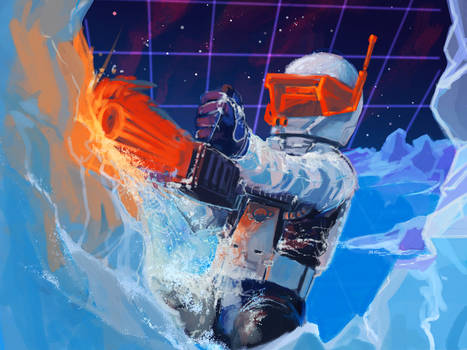

Well it sets an upper bound on compute requirements at ‘simulate 10^27 atoms for thirty years’ remains to be seen if what we can optimize away ever converges with what’s feasible to build.
Programmer from New England Projects


Well it sets an upper bound on compute requirements at ‘simulate 10^27 atoms for thirty years’ remains to be seen if what we can optimize away ever converges with what’s feasible to build.


It would become Twitter.

Can’t wait for the bots to tell us what they learned about b2b marketing!
I’m so hype for typed dictionaries


N64


deleted by creator


I don’t think the vast majority of users use browser plugins at all. Vodoo or not, the barrier is high enough that it’s not a common practice. Certainly not trivial. See the next section; I do think there’s a genuine blind spot among tech literate people.
It’s kinda like if cars shocked you every time you touched the steering wheel. Car enthusiasts of course know how to pop the hood and remove the shock module, but most drivers aren’t car enthusiasts. So when people have a conversation about cars, it needs to start with ‘yeah shock wheels kinda suck’ because that’s what cars are to drivers, even if you have a workaround. If leaving the shock module in as a reminder is what it takes, so be it.


Are we not even going to talk about how many of their sites/wikis are filled with fake/misinformation and go to great lengths to document completely non-existent things in a way that isn’t always obvious to outsiders?
I don’t know how specific that is to Fandom but I am aware of at least one Fandom Wiki for an obscure old console game that’s like 50% inexplicable unmarked fanfiction.


I agree strongly with your gut reaction. I personally use it as the archive of record whenever I digitize some media that would otherwise be lost. I use it when trying to establish how something looked in the past. I don’t need IA to go out and pick losing fights with publishers at the expense of the excellent services they already provide.
It should be noted that if you want digital book loans Libby is fine.


I guess what I’m trying to say is that his contrarian personal views and his contrarian technical views are both expressions of some underlying contrarian-ness. Not that we shouldn’t be asking if he’s a decent person, just that I’m not super surprised to find out he’s gone mask off weirdo.


I lost all respect for his technical taste when he confessed that his daily driver is FreeDOS. I know linux folks skew at least a little contrarian but at that point I don’t think we’re speaking the same language of computing and there’s not much I can learn from ya. Not super surprised to hear he went way overboard contrarian in other ways I guess.


N64 runs ok on pi? Since when? Which PI?


When I search for stuff I don’t seem to get anything.
The nice thing about Samba is that you can find clients for everything.


I’m trying to picture how the other room music is supposed to work. Are you cranking the volume on your TV speakers loud enough to hear in the other toom, or using the PC to control an extra set or far away speakers, or did people used to wire their houses with everywhere speakers controlled from a single receiver?


Great video. Haven’t finished it yet, but did he ever explain why you’d want your media center to be luggable? I feel like if they’d ditched the screen and keyboard they would have something better than a modern streaming box except in 2006, but maybe they sold something like that too.


I really like nonfiction, so I’ll recommend a few.
Wonderful Life (Stephen Jay Gould) was what really helped me understand biology. Really interesting read if you want to hear about evolution or paleontology. If you prefer land animals to Cambrian bugs, Rise and Fall of dinosaurs (Steve Brusatte) is also a great read, though it didn’t blow my mind as much as Gould did.
House and Soul of a new Machine (both by Tracy Kidder) are op opposite ends of the technical spectrum but together form a rich portrait of people at work.
Exploding The Phone (Phil Lapsely) is the book you want if you’re at all interested in retro technology. I suspect many people who care enough to use a ln offbeat social network like this one will enjoy it.
Annals of the former world (John McPhee) is a hefty tome that tells the natural history of United States geology, the history of geology (especially how plate tectonics were discovered) and how geology has interacted with the people living on it.
So like systemd but ten times more dramatic.
Only very occasionally. Masters of Doom and Ubik are examples. I like being able to hand copies of books to friends and family to borrow and I can’t do that with an ebook.
I tell myself I will reread some books, but I can’t imagine ever really doing that. Maybe when my brain is less plastic some day.
Good read. I’d add one more reason: write a post to document something. Might help someone else in the future, might not, but if you ever need to refer back to it, it’s going to help you!